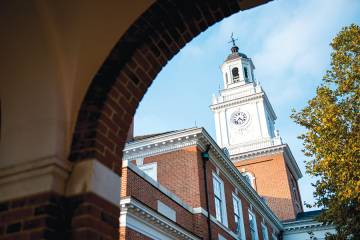A group charged with interpreting the university's mission for the coming decades and developing a new model for undergraduate education has completed a first phase of research and brainstorming and formed working groups to explore key areas.
Now Johns Hopkins University's second Commission on Undergraduate Education, or CUE2, is reaching out for more input from university students, faculty and staff.
Since April, when CUE2 was announced, the 28 faculty, administrators, staff, students, and alumni who make up the commission have been exploring the charge they were given. That charge states that Johns Hopkins "should be a thought leader in defining the nature of post-secondary education, advanced degree acquisition, and lifelong learning in the 21st century."
The commission will proceed with seven working groups to explore topics in-depth:
- Character of a Hopkins education
- Research integration into the undergraduate experience
- Post-graduate pathways
- Community-based learning/applied learning
- Re-imagining teaching and learning
- Accessing and maximizing the benefits of a Hopkins undergraduate education
- Conditions and contexts of learning
"The working groups will address areas where our university can really set the national standard, such as ensuring undergraduates can make the most of valuable research opportunities and applied learning experiences," says Beverly Wendland, dean of the Krieger School of Arts and Sciences and co-chair of the commission. "They will also look at where enhancements might be made to the rigorous liberal arts education we provide, in order to ensure that we are effectively preparing students for successful and fulfilling careers and lives."
The working groups' recommendations will be compiled into a report that will be open for comment in fall 2018. The commission expects to complete its final report by December of next year.
"We cannot emphasize enough the importance of this second commission on undergraduate education," says Ed Schlesinger, dean of the Whiting School of Engineering and co-chair of the commission. "As the landscape for universities is changing around us, we seek to reinforce Johns Hopkins' position as a leader. We need to be prepared to think carefully, thoroughly, and boldly about the structure, content, and opportunities we bring to our undergraduate students in the coming years."
Both co-chairs say they are looking forward to speaking with students about CUE2 and hearing their thoughts on undergraduate education at two casual "Coffee with the CUE2 Chairs" events before the end of the semester. They are scheduled for Nov. 29 from 1–2 p.m. and Dec. 12 from 3–4 p.m. in the Sherwood Room at Levering Hall.
The commission is also planning several events where the university community can hear from national experts and offer their thoughts in a town-hall setting. On Nov. 28 from 3:30 p.m. to 5 p.m. in Arellano Theater, the commission will welcome Jonathan Cole, a Columbia University professor who previously served for 14 years as provost and dean of faculties. Cole is renowned for his scholarship on the development of the sociology of science as a research specialty and recently has focused on issues in higher education. His books include The Great American University: Its Rise to Preeminence, Its Indispensable National Role, Why It Must Be Protected (2010) and Toward a More Perfect University (2016).
Since the spring, the commission has identified assumptions that underlie undergraduate education, brainstormed internal and external challenges and opportunities, and studied summaries of recent work by JHU's peers in this area. They discussed their initial ideas at a retreat in October, where external experts Brandon Busteed from the Gallup organization and John Boyer from University of Chicago offered their perspectives.
The commissioners also discussed ways to capitalize on the work of current initiatives, such as the Task Force on Student Mental Health and Well-being; the Gateway Sciences Initiative; and other efforts focused on diversity and inclusion, Title IX, and wellness, to make sure those efforts are integrated into the recommendations that emerge.
The co-chairs say in the coming months they expect to hold numerous conversations, including formal focus groups, with students, faculty, administrators, parents, and alumni. Individuals are also encouraged to submit comments at any time by email at CUE2@jhu.edu.
Posted in University News
Tagged undergraduate education








